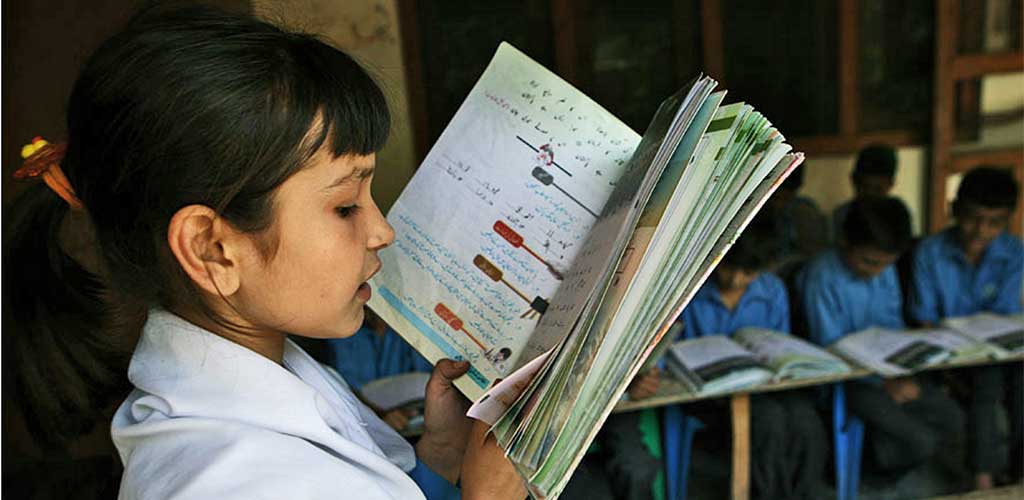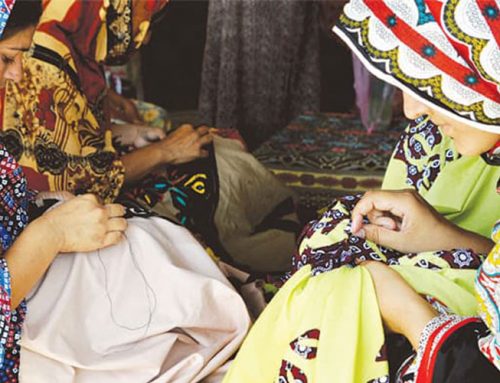Project Description
Developments in Literacy (DIL), educates and empowers underprivileged students, especially girls, by operating student-centered model schools, across Pakistan. DIL is executing a comprehensive education programme strategy spread across years 2014 to 2018. Provision of schools infrastructure & facilities, teachers’ training, libraries, Information & communication technologies (ICT) enabled learning and vocational training centres are the fundamental programme inputs. DIL organization, while being headquartered at Islamabad, Pakistan, supports the programme execution through provision of necessary resources. DIL implementation partners have the responsibility to manage the entire schooling related components in the field.
A comprehensive education programme evaluation has been commissioned by DIL, during April 2015. The programme evaluation scope included school management, student learning assessment, teachers’ evaluation, education quality & value for money. Within this scope, all the programme interventions have been evaluated and analyzed.
DIL education programme is highly relevant within the context of Pakistan, as 25 million children are out of school in Pakistan, between ages 3 to 16 years. Since, girls’ education is an even bigger challenge for Pakistan, therefore its quite encouraging that DIL has ensured to address this facet by enrolling 66% girls in the programme. Similarly, the programme is addressing child retention in the school system, education quality through innovative in-class learning methods and consistent improvement in the teachers’ learning. DIL is operating its schools in really disadvantaged and difficult areas of Pakistan; hence, geographic relevance of the programme is too high, as well.
In-school components including curriculum based learning & teaching, teacher’s training, ICT enabled teaching, and provision of school facilities and structure of parents’ teachers association are the efficient inputs. DIL organizational departments including curriculum, training, monitoring & evaluation, human resource, libraries & ICT are providing the necessary inputs and operational support to execute the programme.
ECE students’ performance in all the areas including recognition of alphabets, phonics, rhyming, weather and primary color recognition etc. has been satisfactorily high. About 50% of the students have not been able to recognize weather & primary colors are certain location including Khura, Mera Khurd, Sangral, Shoal Mozalla & Toot Koh. ECE class room space and sitting facility need improvement.
The utilization of these inputs reflected in terms of student assessment results from grade II to grade VI, suggest that the overall programme efficiency is low, as 33% of the students have not been able to pass the exam. Teacher’s tendency of understanding the curriculum based lesson is good. Teacher’s performance in the areas of asking high end questions, effective utilization of the teaching skills, communication skills of the teachers are the key desirable improvements.
Utilization of ICT for learning has positively impacted student learning, as the results of the schools with ICT learning are better versus the schools without ICT for learning facilities. All the A+ grades (23%) are secured by the students of ICT enabled schools, only.
DIL principals are a key resource, driving the execution of the programme at school level. DIL has been able to deploy and retain professional principals, who are knowledgably proficient in their jobs.
DIL education programme has positively impacted students’ enrollment & retention. Similarly, once marked against the criteria of serving the under privileged & disadvantaged communities students, the programme has delivered a high impact. Adaptation of Government schools has been an effective tendency. Teacher’s training has impacted the teacher’s performance positively, DIL teachers rate the teachers’ training as highly effective. Programme has impacted some of the graduating students positively, they have been able to embrace high academic careers in the areas of medical science and business management.
DIL education programme requires a lot of focus and careful strategy around the aspect of sustainability. There is no defined exit strategy for any of the project being implemented by the programme so far. Engagement of community & local education governance related authorities, are the weaker aspects. The parents’ teachers’ associations are not effectively playing their role to address the education programme sustainability issues pertaining to the proper ownership of the programme at community level. Placement of dedicated community mobilizers can help in bringing the community ownership at DIL schools. The role of school officers needs quantifiable measurement of their job description.
School facilities including separate and functional wash rooms for teachers and students, co-curricular activities related material, electric power, and timely availability of the text books etc. need to immediate attention.
Teachers’ training needs improvement in the area of structured training need analysis and devising a mechanism for marking the utilization of the acquired teacher’s training on the job. Teacher’s compensation and remuneration needs revision. A comprehensive performance management system is required to be installed across DIL for gauging and reviewing teacher’s performance. In order to make this performance management system effective, one needs to come up with the skills and competencies map of the teachers for every subject. Lesson plans of the teachers should include lesson recapitulation techniques and a uniform standard of lesson planning should be developed and rolled out across DIL. Peer teacher model should be continued while defining the performance measurement and progression of the peers involved. Teaching skills, pedagogy, communication skills, student assessment are the key improvements desirable by DIL teachers.
Students’ learning related aspects for the subjects of General Science, English & Math need improvement. Teacher’s inquiry based teaching approach and homework could be the probable strategies to complement students learning in the areas of these subjects. ICT enabled learning function should be addressed in terms of its governance structure and budgeting. A separate inquiry of the ICT enabled learning is highly desirable in order to measure the impact of ICT enabled lesson delivery on student learning.
The role of VTCs can be further leveraged while introducing market need based courses and getting the VTCs courses certified from the Government certification bodies.
DIL needs to put in place a performance management and tracking system for its implementing partners in order to measure and multiply their performance.
A rapid expansion of DIL organization in terms of number of people employed owing to the scale of its operations needs a broad based organization development strategy in place. This organization development strategy should address people, culture, processes and performance related issues and challenges.
All in all, the exuberant work being undertaken by DIL employees, implementing partners, teachers and all other stakeholders involved in serving the cause of education, should continue, with an even great zeal and a quest for more precision around the aspects of education management and leadership.





